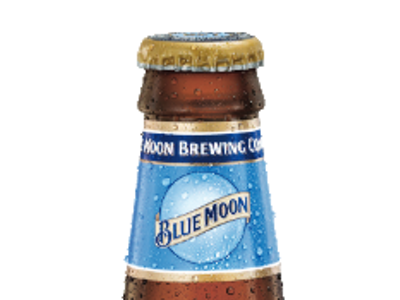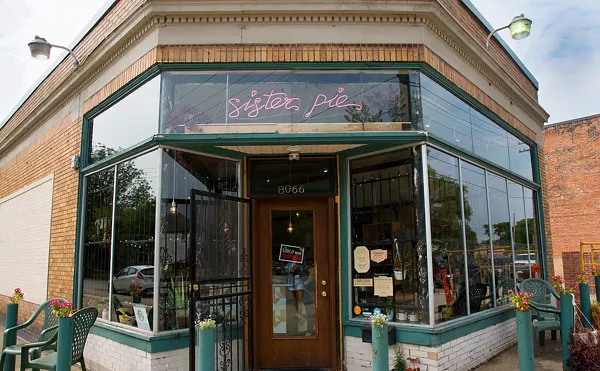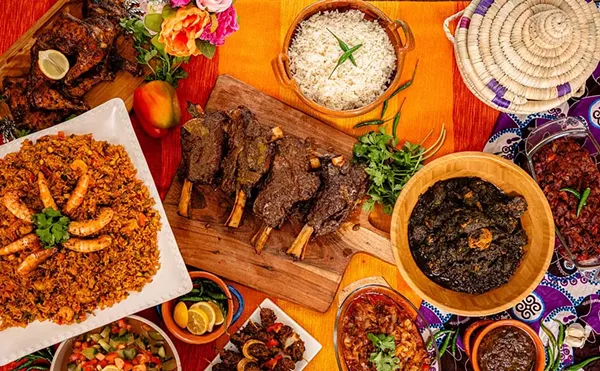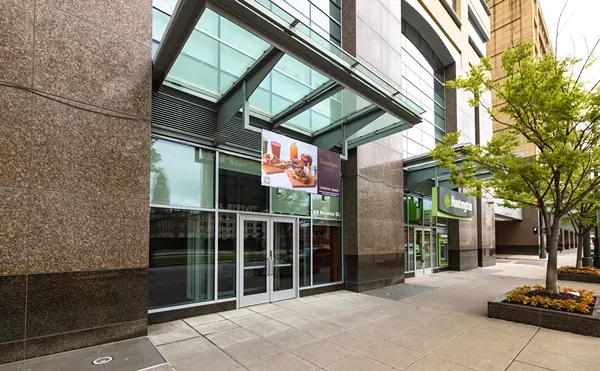
Audio By Carbonatix
[
{
"name": "GPT - Leaderboard - Inline - Content",
"component": "35519556",
"insertPoint": "5th",
"startingPoint": "3",
"requiredCountToDisplay": "3",
"maxInsertions": 100,
"adList": [
{
"adPreset": "LeaderboardInline"
}
]
}
]
Hamtramck has no shortage of ethnic cuisine, satisfying just about every taste imaginable. Want the starchy, pickled, gut-busting Polish food that entices the suburban set? It's there. How about a New York street food gyro plate? Head over to Caniff and Lumpkin to that Desi spot. Aromatic and inexpensive Indian can be found at one of the many unassuming Bangladeshi joints on Conant. And artisanal, new Americana hipster fare is found on and around Joseph Campau at one of Nikita Sanches' spots, or pop-ups Revolver and Yemans Street.
As for Middle Eastern, that cuisine is no less represented in Hamtramck, with eateries offering classic Lebanese-style fare, as well as several hole-in-the-wall Yemeni diners that serve up bountiful ghallabas, shawarmas, pita sandwiches, and other dishes that are quick, healthful, and affordable. So with all that's already on the landscape, the three-month-old Ali Baba Shish Kabob took a chance when it entered the city's food arena. What sets this place apart, though, is the menu ties several regions of Arabic cuisine together, and does it without overloading your senses.
In keeping with its namesake, the real star of the menu is the kabob. But don't let that mislead you: This isn't your skewered, grilled chunks of beef, chicken, or lamb accompanied by some sort of veggie that you may be accustomed to. Here, the kabob is what other parts of the world refer to as kofta. This dish can be found in the cuisine of several countries throughout the East, including Albanian, Afghan, Arab, Balkan, Bangladeshi, Greek, Indian, and Turkish (so basically a huge representation of the immigrant populations that make up metro Detroit). What you're getting is a meatball or meatloaf of minced meat — usually beef, pork, or lamb — mixed with spices and onions.
At Ali Baba, owned by Larry Shallah, who is Chaldean, the kofta is known as the "Iraqi-famous kabob." Mixed with a blend of beef and lamb, parsley, and onions, your senses are pleasantly awakened when you taste the spice sprinkled on top — sumac, which is native to the Middle East, produces a subtle tangy, lemony flavor. The meat is grilled, pretty much medium-rare (a tad pink in the middle) and sits atop a bright yellow bed of rice seasoned with saffron, raisins, and almond slivers. On the side are pickled beets, grilled tomatoes, and onions. Some prefer to peel off the charred skin of the tomato, but we like that smokiness to add to our fork, along with a scoop of the almost-sweet rice and kabob. We also sampled the lamb shank, a traditional Saudi dish that consists of a slab of juicy, braised flesh with an almost buttery, yet flaky consistency, rendering utensils needless. It has a hint of cinnamon flavor, which holds together nicely with the rice. Tikka is another popular dish: It's akin to many diners' notion of kabob, as it's seasoned cubes of tenderloin meat (choice of beef or lamb) or chicken breast, paired with rice, fries or, if you prefea healthier alternative, veggies.
This is the type of place where you're better off sharing one dish between two people. Not only will the main entree and sides fill you up, you also get a choice of soup, salad, or stew. We tried the house salad, which is served on a heaping platter of its own and topped with lemon and virgin olive oil. The lentil soup is hearty and a bit tangy, and a larger bowl of the potato stew could easily be its own satisfying entree.
To drink, we suggest a fruit smoothie, blended with real fruit — not that mixed box that so many coffee shops seem to be fond of these days. That means when you order the banana flavor, you taste nothing but banana. This makes for a refreshing and sneaky way to get fruits into your diet.
Walk into the space, and it's evident that Shallah went through an extensive overhaul to disguise the property's former uses. Once upon a time, the place housed the Kosciuszko Club, as well as a market, a coney island of some sort, a grill, and a bar. Nowadays, the interior invites you to travel to generic exotic-landia, with glossy prints of Babylon, Iraq, Europe, and elsewhere. The ceramic tiling on the floor looks clean enough to eat from it, and the fake grapes that accent the walls are just enough kitsch to tell you that this is a family-owned spot.
This place doesn't seem fixated on trying to re-create a truly authentic take on Iraqi cuisine. Instead, what you find at Ali Baba Shish Kabob is a kaleidoscope of the classic Middle Eastern influences you grew up on, with a little bit more, in a clean setting, with a staff that really appreciates your business.





